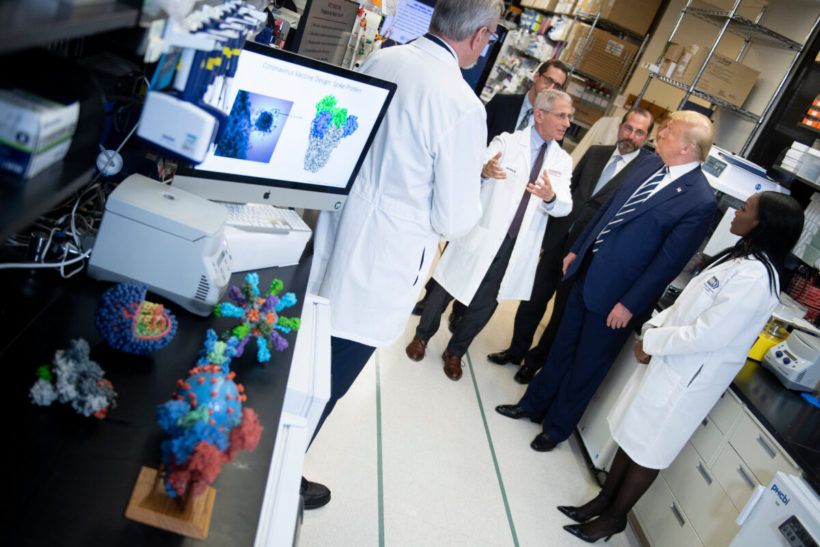
National Institute of Allergy and Infectious Diseases Director Dr. Anthony Fauci speaks to President Donald Trump during a tour of the National Institutes of Health's Vaccine Research Center in Bethesda, Maryland, on March 3, 2020. (Brendan Smialowski/AFP via Getty Images)
print Print...
(by Peter Loftus, The Wall Street Journal) — Researchers have started to recruit healthy Seattle-area volunteers to participate in the first clinical trial of an experimental coronavirus vaccine, a faster-than-expected start for the first vaccine readied for testing.
Kaiser Permanente Washington Health Research Institute in Seattle said Wednesday it aims to enroll 45 adults from the region in the trial. The study will test the safety of various doses of the vaccine developed by biotech company Moderna Inc. and whether the shots produce an immune response.
The development and now testing of the vaccine has moved rapidly as compared with typical vaccine R&D, though federal health officials have cautioned that real-world use of the shots, if they succeed in testing, remains more than a year away.
Even if the first trial has positive results, additional testing would be needed to validate the vaccine’s safety and effectiveness, according to Dr. Anthony Fauci, director of the U.S. National Institute of Allergy and Infectious Diseases (NIAID). Dr. Fauci told a House subcommittee Wednesday he expected it would take at least a year to 18 months to be “fully confident that we would have a vaccine that would be able to protect the American people.” …
Moderna, of Cambridge, Mass., shipped the first batch of the vaccine to be used in human testing last week, a rapid turnaround time after researchers learned the virus’s genetic sequence in January.
The vaccine contains the genetic material RNA, designed to instruct the human body’s cells to make a protein from the coronavirus that doesn’t cause infection but triggers an immune response to the virus. The vaccine isn’t made from the actual virus.
The vaccine study is being sponsored by the NIAID, which helped design the Moderna vaccine.
The Kaiser Permanente Institute has a vaccine treatment and evaluation unit that is one of several such sites in the U.S. conducting infectious-disease research with funding from the NIAID.
Lisa Jackson, a senior investigator at the institute and lead researcher for the study, said dosing could start in the next few weeks. “That we have a vaccine supply to conduct a trial within a two-month period is pretty much unprecedented,” she said in an interview.
For the vaccine trial, the institute is planning to enroll healthy adults ages 18 to 55 who meet certain criteria. To be eligible, they can’t have certain health conditions or be taking medications that affect the immune system.
The study participants will receive two injections of Moderna’s vaccine 28 days apart, according to a summary of the trial posted on the government database clinicaltrials.gov. Researchers expect the subjects to come to 11 in-person visits and have four phone conversations with trial personnel over a 14-month period.
Study subjects will receive $100 for each visit, and people who complete all scheduled visits would get a total of $1,100, according to a website set up by the Kaiser institute to recruit volunteers. …
Several other companies and organizations including Johnson & Johnson and Sanofi are developing vaccines against the new coronavirus, with testing expected to begin in the coming months. Inovio Pharmaceuticals Inc. said Tuesday it was accelerating the timeline for its experimental coronavirus vaccine and plans to start a clinical trial in healthy volunteers in April.
Published at wsj .com. Reprinted here for educational purposes only. May not be reproduced on other websites without permission from The Wall Street Journal.
Questions
Note: Before answering the questions, watch the video under “Resources” below.
1. Define the following as used in the article:
- clinical trial
- experimental
- vaccine
- biotech
- R&D
2. The first paragraph of a news article should answer the questions who, what, where and when. (In this article, 1st and 2nd paragraphs). List the who, what, where and when of this news item. (NOTE: The remainder of a news article provides details on the why and/or how.)
3. What two outcomes will the clinical trial test for?
4. What do health officials want the public to know about the timeline for the vaccine? Be specific.
5. What criteria must a person have to be eligible to participate in the vaccine trial?
6. a) How often and for how long will study participants be involved in the trial?
b) How much will study participants be paid?
7. The fact that researchers have a vaccine supply to begin a trial within a two-month period, is described in the article as:
“faster-than-expected” “rapidly” “a rapid turnaround” and “unprecedented.” How does this good news encourage you?
8. Do you think the amount, length and content of media reporting on the coronavirus has been: informative, helpful, necessary, responsible, providing useful information, lengthy but not informative, fearmongering, too much, uninformative, intended to keep people tuning in out of fear… Explain your answer.
Daily “Answers” emails are provided for Daily News Articles, Tuesday’s World Events and Friday’s News Quiz.



